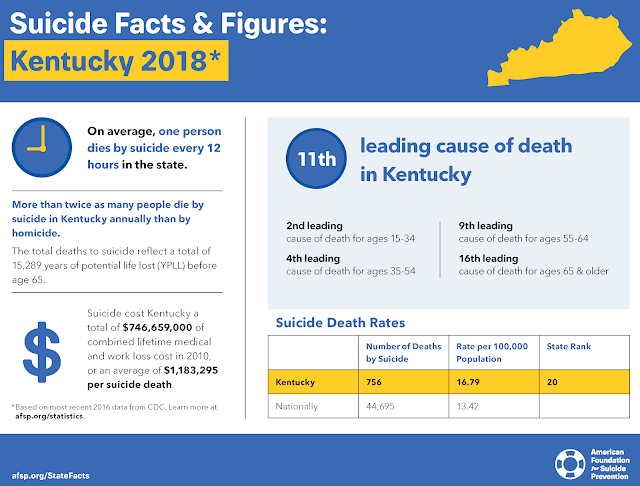Celebrity suicides raise concern about ‘contagion;’ Ky. rate higher than most states; experts say we need to talk about it openly

“The suicides of fashion designer Kate Spade and celebrity chef Anthony Bourdain just days apart . . . have mental health professionals worried about the potential for what’s known as a ‘contagion’ effect, but at the same time they say media coverage may lead people to seek help,” Marek Mazurek and Laney Ruckstuhl report for The Boston Globe.
“Anytime there’s a public figure, it affects a great many people,” Debbie Helms, co-chair of the Massachusetts Coalition for Suicide Prevention’s Northeast region, told the Globe. “Celebrities impact the whole country.” Calls to suicide-prevention centers rose after the two deaths.
Kentucky has a higher-than-average suicide rate, greater than five of the seven adjoining states (the exceptions being West Virginia and Missouri). The rate has increased in almost every state since 1999, to the point that suicide is the 10th leading cause of death in the U.S., with 123 per day, more than the number killed in automobile accidents, according to the federal Centers for Disease Control and Prevention. In Kentucky, suicide ranks 11th as a cause of death.
Kentucky’s suicide hotspots are Marshall County, which had 49 from 2012 through 2016, and Grayson County, which had 35. Per 100,000 population, respectively, the counties’ suicide rates were 29.2 and 26.2. The rate for the entire state was 16.79, 20th in the nation.
Suicides among teenagers are an increasing concern, especially in Kentucky. The number doubled between 2014 and 2016, from 19 to 44. The 2016 Kentucky Incentives for Prevention survey, given at participating Kentucky schools in even-numbered grades from 6 to 12, found that 15.4 percent of Kentucky high-school sophomores said they had “seriously considered” attempting suicide in the 12 months prior to the survey. The rates tended to be highest in Western Kentucky.
Young people have the greatest risk of being influenced by widely reported suicides, Boston psychiatrist Blaise Aguirre, who specializes in adolescents at risk of suicide, told the Globe. “When you have these young people already thinking about that and some of their idols are dying by suicide, it sort of — in their thinking — makes it more acceptable in a certain kind of way,” he said. “It seems like somewhere between 14 and 24, in that age range, they are particularly vulnerable.”
The “suicide contagion effect” seems to have been heightened by the rise of social media, Aguirre said: “For many years, if somebody famous died by suicide, you might read about it later in the newspaper, but young people weren’t necessarily in the habit of reading the papers. Now, there is the ability of this news to spread rapidly.”
Aguirre and other experts said that makes it all the more important to speak openly about suicide and reduce the stigma that often surrounds mental-health issues, “and making sure loved ones know they aren’t alone,” the Globe reports. For warning signs of suicide, go to suicide.org.